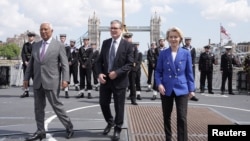The first EU-UK summit since Brexit over five years ago moved Britain closer to the EU, but without crossing any well-known Brexit red lines such as rejoining the EU’s customs union or single market.
The May 19 meeting in London came as one of the most prominent Brexiteers, Nigel Farage, and his populist Reform UK party top some public opinion polls in Britain.
In the end the two sides agreed on three documents in the British capital -- a so-called “common understanding,” a joint statement, and a Security and Defense Partnership (SDP).
While most attention among diplomats and in the media in the run-up to the meeting was thorny issues such as access to British fishing waters for EU vessels and agriproducts from the UK entering the bloc’s internal market, one of the dominant aspects of the new partnership is closer foreign policy alignment.
The common threat, Russia, is clearly underlined in the agreed documents.
The Security and Defense Partnership states that “the European Union (EU) and the United Kingdom of Great Britain and Northern Ireland (UK) face a volatile and increasingly challenging security environment in Europe and in its broader neighborhood, as demonstrated by Russia’s unprovoked and unjustified war of aggression against Ukraine.
Russia attempts to change unilaterally, by force, the internationally recognized borders of Ukraine and the security order in Europe.”
The SDP mainly outlines more diplomatic cooperation between London and Brussels such as the increased presence of the British foreign minister and other diplomats in various EU meetings and working groups.
The signing of the document does, however, pave the way for the participation of British arms companies in the EU’s new 150-billion-euro rearmament fund.
The joint statement that also was signed off in London is clearer on potential future measures both in support of Ukraine and how to counter the Kremlin.
While not clearly stated, the United Kingdom and the EU both appear dismissive of the idea that the new US administration has been floating such as sanctions relief for Moscow and the need for Ukraine to give up territory under Russian occupation to achieve peace.
The document states that “we remain ready to continue to exert pressure on Russia, including through further sanctions and taking measures to prevent their circumvention, sectoral measures and caps on oil prices, and by ensuring that Russian Sovereign Assets remain immobilized until Russia ceases its war of aggression against Ukraine and compensates it for the damage caused by this war.”
The European Union foreign ministers on May 20 agreed to another round of sanctions against Russia and the bloc is mulling more measures if Moscow isn’t engaging constructively with Kyiv in cease-fire or peace talks. These measures would also be coordinated with the United Kingdom.
The text is also clear in not recognizing Russian annexation of occupied territories: “we work closely to ensure a comprehensive, just and lasting peace that assures Ukraine’s independence, sovereignty and territorial integrity within its internationally recognized borders.”
In a rebuke to Washington’s decision to walk away from a new war tribunal set up by Western states last week, the joint communique underlined that “we are committed to ensuring full accountability for war crimes and other serious crimes committed in connection with Russia’s war of aggression, including by the establishment of a Special Tribunal for the Crime of Aggression against Ukraine.”
Aside from Ukraine, the text is short on details on other foreign policy areas, but it does express support for Moldova’s territorial integrity and sovereignty and pledged that “through coordinated efforts to uphold the security, and territorial integrity and constitutional order of Bosnia and Herzegovina and to advance the EU facilitated dialogue between Belgrade and Pristina.”









